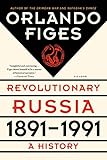Revolutionary Russia, 1891-1991 :
Material type: TextPublisher: New York : Picador/Henry Holt and Company, 2015Copyright date: ©2014Edition: First Picador edition: April 2015Description: 324 pages ; 21 cmContent type: text Media type: unmediated Carrier type: volumeISBN: 1250062624; 9781250062628Subject(s): Insurgency -- Russia -- History -- 19th century | Revolutions -- Russia -- History -- 20th century | Revolutions -- Soviet Union -- History | Russia -- Politics and government -- 1894-1917 | Russia -- History -- Nicholas II, 1894-1917 | Soviet Union -- History -- Revolution, 1917-1921 | Russia -- History -- 19th century | Russia -- History -- 20th century | Soviet Union -- HistoryDDC classification: 947.084
TextPublisher: New York : Picador/Henry Holt and Company, 2015Copyright date: ©2014Edition: First Picador edition: April 2015Description: 324 pages ; 21 cmContent type: text Media type: unmediated Carrier type: volumeISBN: 1250062624; 9781250062628Subject(s): Insurgency -- Russia -- History -- 19th century | Revolutions -- Russia -- History -- 20th century | Revolutions -- Soviet Union -- History | Russia -- Politics and government -- 1894-1917 | Russia -- History -- Nicholas II, 1894-1917 | Soviet Union -- History -- Revolution, 1917-1921 | Russia -- History -- 19th century | Russia -- History -- 20th century | Soviet Union -- HistoryDDC classification: 947.084 | Item type | Current library | Call number | Status | Date due | Barcode | Item holds |
|---|---|---|---|---|---|---|
 Books
Books
|
Main Library Non-Fiction - General Stacks | 947.084 .F471 2015 (Browse shelf (Opens below)) | Available | 17076 |
Includes bibliographical references (pages 297-308) and index.
Start -- "Dress rehearsal" -- Last hopes -- War and revolution -- February revolution -- Lenin's revolution -- Civil War and the making of the Soviet system -- Lenin, Trotsky and Stalin -- Revolution's golden age? -- Great break -- Stalin's crisis -- Communism in retreat? -- Great terror -- Revolution for export -- War and revolution -- Revolution and Cold War -- Beginning of the end -- Mature socialism -- Last bolshevik -- Judgement.
In this elegant and incisive account, Orlando Figes offers an illuminating new perspective on the Russian Revolution. While other historians have focused their examinations on the cataclysmic years immediately before and after 1917, Figes shows how the revolution, while it changed in form and character, nevertheless retained the same idealistic goals throughout, from its origins in the famine crisis of 1891 until its end with the collapse of the Soviet regime in 1991. Until the very end of the Soviet system, its leaders believed they were carrying out the revolution Lenin had begun. With the authority and distinctive style that have marked his magisterial histories, Figes delivers an accessible and paradigm-shifting reconsideration of one of the defining events of the twentieth century.

